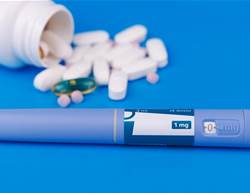When you’re on your period, cramps are expected—cue the heat pack on the couch and a packet of pain relief nearby. But cramps after sex? That can be a red flag. “These cramps are usually felt in the lower pelvis, vagina or even rectal area,” explains obstetrician-gynaecologist and sexual and reproductive health expert Dr Alyssa Dweck. “They can be fleeting for a few seconds or last longer, may come and go, and vary in intensity.”
Cramps after sex can happen, Dr Dweck says, and they’re not always a cause for concern—but in some cases, they signal something more serious and should be checked by a healthcare provider.
“Unfortunately, many women who experience pelvic pain are either afraid to speak up or have had their pain dismissed,” says board-certified reproductive endocrinologist, endometriosis specialist and medical director of reproductive surgery Dr Barbara McGuirk. “It happens much more often than we think because it’s a difficult topic to talk about, especially with your partner. Never feel bad about reaching out to a doctor, and if necessary, seek a second opinion.”
Below, doctors explain the common causes of cramping after sex, more serious triggers, and what to do if it keeps happening.
Orgasm
It’s not unusual to feel cramps after climaxing, according to Dr Dweck. “These are usually a result of uterine muscular contractions which naturally occur with orgasm,” she says. They typically settle on their own with deep breathing and rest. But if the pain lingers or worsens, it may be a sign of an underlying issue—don’t hesitate to contact your GP or gynaecologist.
Urinary tract infection (UTI)
Sometimes, cramps after sex could be a sign of an infection, such as a vaginal infection or urinary tract infection (UTI), says Dr Dweck. Cramping and pressure in the lower abdomen is a common symptom of a UTI, so it’s not surprising the pain might feel worse after intercourse.
Vaginal dryness
Vaginal dryness—often linked to menopause or certain medications—can also lead to cramping after sex, explains Dr Dweck. The good news? There’s absolutely no shame in reaching for a natural or water-based lubricant to reduce friction and make things more comfortable.
Ovarian cysts
Ovarian cysts are fluid-filled sacs that form on the ovaries, which are the glands that house your eggs. During sex, a cyst can rupture or leak, triggering sudden or sharp pelvic pain, says Dr Dweck. If that happens, it may be serious enough to warrant a visit to your GP or even the emergency department. According to the Office on Women’s Health, ovarian cysts may cause dull aches or acute pain in the abdomen or pelvis.
Endometriosis
“The majority of women who have pain during sex are women who have endometriosis,” says Dr McGuirk. Endometriosis is a condition where tissue similar to the lining of the uterus (the endometrium) grows in places it shouldn’t—like the ovaries, pelvis or abdomen. This misplaced tissue can trigger inflammation and form scar-like adhesions that may cause organs to stick together, explains Dr McGuirk. The result? Pain that can range from disruptive to debilitating—and even affect fertility.
Pain during and after sex is the second most common indicator of endometriosis after painful periods. If you’re experiencing either, Dr McGuirk urges speaking to a trusted healthcare provider. Treatment depends on how advanced the condition is. In some cases, the scar tissue can be surgically removed or treated with ablation. But even with treatment, some women may continue to develop new lesions until menopause, according to gynaecologist Dr Angela Chaudhari.
Premenstrual syndrome (PMS)
It might sound obvious, but if your period is on the way, cramps after sex (and in general) can be expected, says Dr Dweck. The same applies if you’re already on your period. Over-the-counter pain relief, a hot pack, or a warm shower can help take the edge off.
IUD
An intrauterine device (IUD) is a T-shaped device inserted into the uterus as long-term contraception. If you’ve recently had one placed or removed, some cramping and light spotting is normal, according to Planned Parenthood. But if the pain lasts beyond a few months, it’s worth checking in with your GP.
Rough Sex
Sometimes, cramping can be linked to more vigorous sex or trying new positions—especially if you have anatomical differences like a tilted uterus, says Dr Dweck. Pay attention to how your body reacts and don’t be afraid to pause, change positions, or talk it through with your partner.
Prior surgeries
Any abdominal surgery—including a caesarean—can result in discomfort during sex, notes Dr McGuirk. Relief may be as simple as changing positions or, in some cases, consulting your doctor for a more tailored approach.
Irritable bowel syndrome (IBS)
IBS might not seem related to your sex life, but it can cause pelvic discomfort or pain during intercourse, says Dr McGuirk. Managing symptoms with the help of a gastroenterologist—through diet, lifestyle changes, and possibly probiotics—can make a difference.
Interstitial cystitis
Interstitial cystitis is a chronic condition that affects the bladder and can cause ongoing pelvic pressure, pain, and discomfort during or after sex. It’s part of a broader group of disorders known as painful bladder syndrome, explains Dr McGuirk. Treatments range from prescription medications to surgery, depending on severity.
Pelvic inflammatory disease (PID)
PID is an infection of the reproductive organs caused by bacteria, says Dr McGuirk. It can lead to pelvic pain, fever, chills, and unusual discharge. The good news: it’s usually treatable with antibiotics. But if left untreated, it can cause long-term issues like chronic pelvic pain or infertility.
If none of these conditions seem to apply but you’re still feeling pain after sex, Dr McGuirk recommends seeing a doctor—especially if your symptoms include abnormal bleeding, discharge, or fever.










